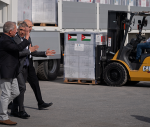You are here
Oceans apart at Cairo talks
Aug 12,2014 - Last updated at Aug 12,2014
The two sides locked in a tough fight in Gaza seem to be eager for a truce, but not at any price.
For the heavy life loss and massive destruction the Palestinians have suffered under a vicious and a cruel Israeli army onslaught, bent largely on revenge and collective punishment, they have a number of very legitimate demands.
They seek an end to the eight-year-old siege from land, sea and sky; operating airport and sea port in Gaza, destroyed in previous wars; unrestricted fishing in their share of Mediterranean; reconstruction of their homes and unrestricted farming on all their land, even that close to the Israeli border.
The Palestinians also demand guarantees that Israel will not conduct attacks against them or assassinate resistance leaders.
Because such demands are legitimate and correct, it is hard not to take them into serious consideration in the negotiations currently taking place in Cairo towards a semi-permanent ceasefire.
For any peace between the two sides to last, the 1.8 million people in Gaza should be guaranteed decent and dignified life, free of siege and humiliating occupation measures.
But that is not going to be easy for the Israeli government, not because of its adamant reluctance of enabling the resistance organisations which fought well in this last war with any battle benefits but also out of real fear that opening the doors of Gaza to the outside world would mean bringing in more arms and preparing better for future wars.
The Israelis are introducing tougher, and most unjustified, demands. They want to keep Gaza and its population under a different kind of siege.
Crossing points may be open, but only once put under tight and strict supervision to prevent any possibility of allowing any goods deemed by the Israelis as useful for resistance purposes. With respect to building materials, the Israeli side wants every bag of cement entering Gaza to be traced, to ensure that it will not end up lining a tunnel.
Moreover, Israel demands that resistance disarm. It is impossible for the Palestinians to accept these Israeli demands, not only because they are illegitimate, but also because they are ridiculous.
Any application of international justice should require the exact opposite: arming the Palestinian defenceless victims to enable them to defend themselves against siege and sustained aggression, and, at the same time, banning any weapons from reaching the Israelis because they have been, for decades, using their most lethal, even banned, weapons, against innocent civilians under occupation.
International law, as a matter of fact, requires Israel, as an occupying power, to provide protection for the occupied Palestinians, rather than bomb them.
When Israel decided to leave Gaza in 2005 because the occupation there had turned costly and risky, a regime of siege was put into place to prevent the resistance from building military capacity.
Every crossing was tightly monitored, either by Israel or by European and other monitors, but that did not seem to have worked; rockets were smuggled in, some were manufactured and developed.
Any future restrictions are not likely to be effective either. When there is a will there is a way.
The obvious conclusion, therefore, is that it would be difficult for the Cairo talks to achieve more than a temporary and fragile truce, if at all, bearing in mind the conflicting and the contradictory nature of the two sides’ demands.
This also shows that there is no partial solution for Gaza, separate from that of the other files of Israeli-Palestinian conflict.
There must be a package for the Palestinian-Israeli dispute, in its totality, in one go.
Because 80 per cent of the Gaza inhabitants are refugees who were originally made to flee their towns and villages in Palestine by the invading Zionist forces, in 1948 and in 1967, they consider their stay in Gaza as temporary, until a just solution for their cause is reached.
To live decently in peace, not under regular attack or threat of attack from their cruel occupiers; to be free of siege; and to be allowed to secure their basic living needs is, however, not their ultimate aspiration.
They want more than that. They, like all other Palestinians, within or outside geographic Palestine, want their rights restored justly and correctly.
Seven decades of suffering, destitution, persecution, direct attack and enormous sacrifice did not seem to blunt the Palestinians’ resolve to fight for their lost land and rights.
As a matter of fact, and contrary to the expectations of many, the Palestinian attachment to their original homeland is with time getting steadily stronger, one generation after another.
The world saw Palestinian men and women standing on top of the rubble of their demolished homes in Gaza with nothing left for them except the little they were wearing, declaring proudly and courageously to reporters: “We are not leaving. They bombed our homes we will build again, they killed our kids we will produce more, but we are here to stay and we stand by the resistance.”
No amount of Israeli criminality will be able to conquer the spirit of such people, although Israel is still oceans apart from this obvious and definite conclusion.
The very critical dilemma is that while we realise that there is no partial solution for Gaza, we, at the same time, realise that there is no prospect for dealing with the conflict in its entirety in the foreseeable future either.
Regrettably, and realistically, the only political space available is crisis management and temporary remedies: wars separated by fragile ceasefires.
In a region that is already burdened with serious manifestations of instability, rise of extremist movements, chaos, states’ disintegration and sectarian conflict, if the level of the Palestinian-Israeli occasional fighting can be kept within controllable levels, it is hard to expect that major regional powers can be drawn into the conflict any time.
Apart from some Arab states, Iran and Turkey were — actually still are — monitoring the situation in Gaza very closely. The risk of a larger and a more devastating regional war remains.
Should we take that inevitability for granted?
Maybe not.
Wisdom requires Arab and international political mobilisation to place this conflict on urgent action agenda.
That should not mean routine resumption of the outdated and worn out Palestinian-Israeli talks that ended in failure few months ago.
Bad, half-hearted, timid and accommodating peace projects in the last four decades have been totally counterproductive.
By adopting Israeli positions almost entirely, all past peace plans encouraged Israeli intransigence and territorial greed, to the extent that the gap between the sides kept widening.
Every time the Palestinians made major concessions, at the expense of their rights, to narrow the gap, the Israelis introduced more excessive demands.
There is no hope of any change in Israel’s behaviour unless there is a radical change in the international and UN approach to the issue. Only if that happens, only if Israel, for once, is confronted with a unified Arab and international demand and the full application of international law and accountability for all the past war crimes is there any chance for change.
That appears remote, but what other options are there?













